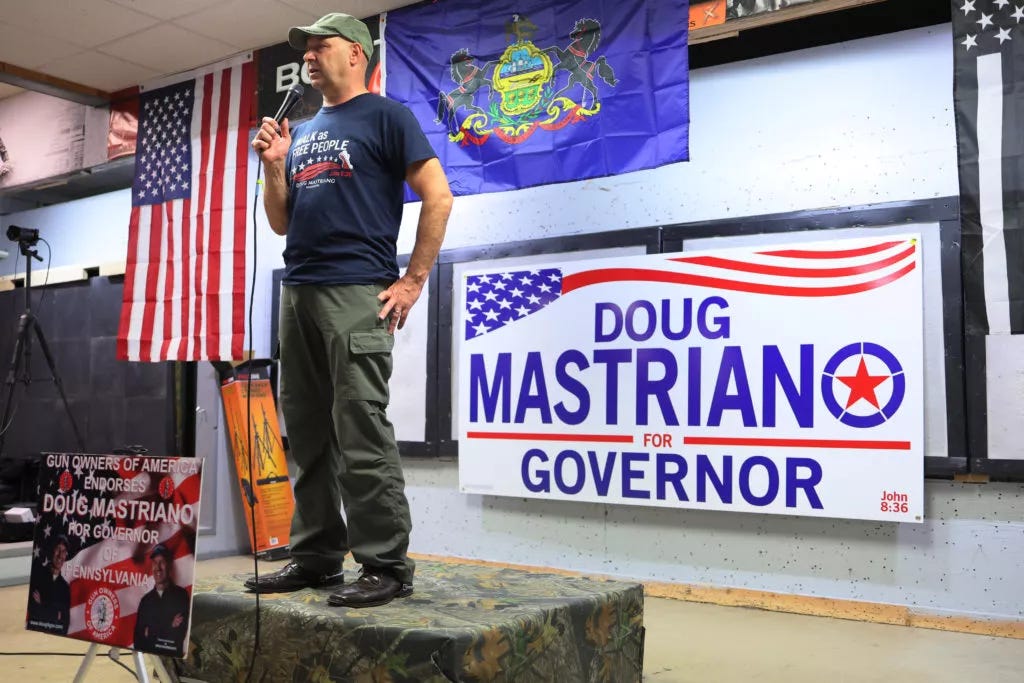Recently at The Bulwark:
CHARLIE SYKES: A Crisis of Patriotism
WILLIAM KRISTOL: A (Somewhat) Hopeful Thought for the Fourth.
SAMUEL L. SCHEIB: Rediscovering ‘The Star-Spangled Banner’—in Its Entirety.
You can support The Bulwark by subscribing to Bulwark+ or just by sharing this newsletter with someone you think would value it.
AMANDA CARPENTER: Doug Mastriano’s Election-Takeover Plan.
By now, political junkies are familiar with the rucksack of election-denying baggage that Pennsylvania GOP gubernatorial candidate Doug Mastriano schleps around: He organized a faux post-election legal hearing for Rudy Giuliani in Gettysburg; he asked Congress to deny Pennsylvania’s electors; he spent thousands of campaign funds busing people to the Capitol on Jan. 6th; he was filmed crossing police barricades; some of his supporters were arrested for their activities that day, and he visited Arizona to observe its disastrous Cyber Ninjas audit in hopes of replicating it in Pennsylvania.
Those are only the highlights of what Mastriano has done in the past. But what about the future? People like Mastriano are never going to let Donald Trump’s 2020 election loss go. If anything, Trump’s “Stop the Steal” lies provide a pretext for actions intended to ensure MAGA types win in future elections.
How will they do it? Well, Mastriano has some ideas. (Well above and beyond hiring Trump’s throne-sniffing flack Jenna Ellis as his legal adviser.)
The Supreme Court revealed itself as an aggressive, confident, and conservative court. But rulings this term have intensified the attacks on its legitimacy. Adam White joins Charlie Sykes on today’s podcast.
Bulwark+ members can listen to an ad-free version of these podcasts on the player of their choice. Learn more at Bulwark+ Podcast FAQ.
MONA CHAREN: A Pro-Choicer and a Pro-Lifer Do Lunch.
The day Dobbs was handed down, I happened to be lunching with a new friend who was upset and angry over the decision. She’s a libertarian and strongly pro-choice. I said “Sorry,” and meant it. Not that I agreed it was a bad decision (I was in the mushy middle with Justice Roberts), but just that I understood her feelings and sympathized. She, in turn, has lately come to see that pro-lifers have many good arguments, even if, at the end of the day, she didn’t find them compelling enough to change her mind.
That mutually respectful conversation on a fraught topic probably belongs in a museum in today’s bitterly divided country, but both of us have changed over the past six years. Alarmed and repelled by the extremism and illiberalism gripping both sides of the political spectrum, we’ve consciously sought to be countercultural—to find common ground with those we previously shunned or dismissed. We’re part of a cross-partisan group that meets semiannually to consider how best to defend liberal democracy from its many enemies.
Because I’ve become something of a centrist, my views about abortion have changed a bit (probably just enough to make both sides angry with me). Still, as someone who spent decades in the pro-life world but who has many new pro-choice allies, perhaps I can shed some light on our predicament by highlighting what I think are blind spots or misunderstandings on both sides, and also some possible areas of agreement.
CATHY YOUNG: Supreme Court Opens the Door to Future Cases About Religion in School.
As part of the flurry of end-of-term decisions that included overturning Roe v. Wade and striking down New York’s strict concealed-carry gun laws, the Supreme Court also issued a 6-3 ruling last week touching on state establishment of religion. In Kennedy v. Bremerton, the Court sided with a football coach who claimed he was unjustly fired for praying at midfield after games. The American Civil Liberties Union deplored the ruling as “deeply disappointing” and said that it “significantly erodes the separation of church and state in public schools”; conservative groups hailed it as a victory for the First Amendment.
The ruling in this case is not the endorsement of theocracy, or even of extensive church/state entanglement, that its critics fear it is. True, the court explicitly jettisoned the traditional “Lemon test” (based on the 1971 Lemon v. Kurtzman case), which held that the state’s conduct in Establishment Clause cases must have “a secular purpose,” must neither advance nor inhibit religion, and must not “foster excessive government entanglement with religion.” The test has been riddled with problems of subjective interpretation from the start and was arguably reduced to irrelevancy over the years. However, the implications of Kennedy v. Bremerton for determining what practices may cross the line into religious coercion are unclear because of the peculiar nature of the case, which rests on a hotly disputed narrative. “The first and most important thing to realize is that the outcome in this case, more than the specific reasoning, is very closely tied to at least what the majority viewed as the facts,” UCLA law professor and blogger Eugene Volokh, who specializes in First Amendment law, told me in a telephone interview.
🚨OVERTIME 🚨
Citizenship at Mt. Vernon… A neat tradition continues, this time with Sec. Janet Yellen.
Rudy and Graham subpoenaed… Big news from Fulton County, Georgia.
The return of Nathan Fielder… I am actually pretty excited about this new show.
Lonely Last Days in the Suburban Office Park… The NYT has this look at the future of work and its past.
Children doing parkour? The rise of DALL-E.
When MN Republicans didn’t read the bill… They voted to legalize edible drugs.
Bootlegging in Pripyat. A look at how the Soviets tried prohibition after Chernobyl.
I hope you had a Happy Fourth… I spent it in Downtown Washington, watching the D.C. fireworks for the first time in years. Washington is always on high alert, but as I looked at the snowplows (used for crowd control) and road closures and heavy police presence, I thought about Highland Park, a community that sounds an awful lot like my hometown in Cleveland.
And as our fireworks were going off, I looked at my phone and saw the news and images of crowds fleeing in Philadelphia after two police officers were shot.
My mind wasn’t on the Smiley Face and Heart fireworks exploding next to the Washington Monument anymore. My kids were waving flags in relative safety while, earlier in the day, kids their age were coloring patriotic coloring books in the basement of a store, waiting for an all clear to leave.
I had to wait for my kids to pass out at the end of the day before I could get more details.
I opened my inbox and found a reply to our Fourth of July note to readers. The reader observed, “you spoke too soon” with regard to putting politics aside and celebrating America with neighbors and friends. Fair enough.
Another reader wrote, earlier today: “I feel like the Bulwark's greatest impact will be building bridges between people who don't agree on a lot of things, but want this country to be better for all of us.”
Indeed. I wish those kids in Highland Park didn’t have to witness that. I wish that the other kids who lived nearby didn’t have to shelter in place in fear. I wish such horrors didn’t feel increasingly like the backdrop of everyday life in America. (I wish the adults didn’t, either.)
But those things happened. To our neighbors, to our fellow countrymen. To kids. Our failure to protect them is a matter of politics and policy, and a matter of moral urgency.
We cannot wish away such failures. But what we at The Bulwark can do—and are doing, along with you—is build a space of mutual understanding and work together towards solutions. Because our country needs a lot of help. All of us who can step up, should step up.
I’ll leave you with this apt track from Coldplay, as “everyday life” can be a downer, like it was yesterday. It’s on us to change it.
That’s it for me. Tech support questions? Email members@thebulwark.com. Questions for me? Respond to this message.
—30—
Editorial photos provided by Getty Images. For full credits, please consult the article.





